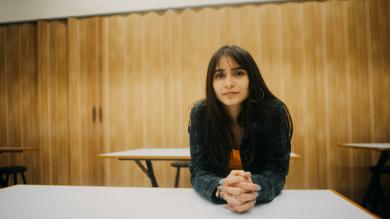Students in ODU's Community College Leadership Ph.D. program gathered from across the U.S. for a two-week institute.
As a faculty member with Old Dominion's Department of Educational Foundations and Leadership, Associate Professor Shana Pribesh teaches research methods and statistics.
They're not touchy-feely kinds of courses, but over the years Pribesh has found ways to make the rigorous, challenging subject matter both fun and memorable. That was no more evident than when she taught the Advanced Research Design and Analysis course for students in ODU's Community College Leadership (CCL) Summer Institute, which ended in mid-June.
Summer Institute is a two-week intensive study required for students in the CCL Ph.D. program during their first and second years. The students, who take all other classes via distance learning, came to campus - for the first time - from across the country, including Arizona, Washington, Illinois, New Jersey, West Virginia, North Carolina and Virginia. They lived on campus in Ireland House. (The institute is also required of the newly admitted higher education doctoral students.)
The CCL doctoral program attracts students who wish to pursue leadership roles in the community college setting. Unique leadership issues addressed in the program include the diversity of student bodies, the role of the community college in higher education, the importance of workforce preparation provided by community colleges and the role and expectations of the community. The program typically requires 48 to 54 credit hours beyond the master's degree, and many students complete the program in two calendar years.
Pribesh was one of five ODU faculty members who taught classes for this summer's institute, which offers intensive coursework and preparation for the dissertation process. Other Darden College of Education faculty members teaching courses were Dana Burnett, Dennis Gregory, Alan Schwitzer and Mitchell Williams, who directs the CCL program. This summer's institute also had a guest scholar, Stephen Katsinas, a prominent researcher in the field of community colleges. Katsinas, director of the Education Policy Center at the University of Alabama, spoke to students throughout the week.
Williams said the program is fortunate to have a cadre of outstanding faculty members to provide this unique experience for the students. "By coming together at ODU for two weeks, the students develop the professional relationships with other students and with faculty members which will help them to be successful in the dissertation process," he said. "Our faculty members are student-centered, dedicated to helping students succeed, not only in the rigorous courses and the challenging dissertation process, but to ensure the development of the skills needed to lead the community college of tomorrow."
Pribesh taught one section of her course for nine of the 21 the CCL students this summer. The course was a week long, with classes starting first thing in the morning and running until the end of the day.
"This was my second year teaching for the Summer Institute, and I loved it," Pribesh said. "This year, Cohort 11 was fearless and super supportive of each other. They went right at the hard issues in research methods. They were game to try anything and worked incredibly hard."
The intensified format of the Summer Institute courses can be a challenge - for both the faculty member and student - but Pribesh said everyone was up to the task.
"Although the students do a lot of work before and after the course, it can be daunting to take a doctoral research methods class in a one-week format - like drinking from a fire hose," she said. "I really appreciate how every student comes ready to take risks, support others while we all stumble around and crank out the numerous assignments. I am very impressed with every student that has come to the Summer Institute."
They even managed to have some fun along the way.
"Each year we have a little 'trophy' we pass around when someone asks a killer question or makes a great insight. This year it was Dazzle Bear. By the end of the week, Dazzle Bear was blinged out with a fake mustache (important for unobtrusive observations) and a Sweet Tart (we used candy to simulate quantitative research designs)," Pribesh said.
During an event at this summer's institute, it was announced that one member of last year's Cohort 10, second-year student Shashuna Gray, had recently been named dean of arts and sciences at Virginia's Germanna Community College.
Jim Maccariella, who was at ODU for the institute this month, said he enjoyed his time on campus and the "camaraderie of the cohort," although he noted that it was difficult to leave his family and job for two weeks. "It was a great opportunity to get to know your classmates and faculty. I think this type of experience is valuable in that it stresses the department's commitment to quality and content."
An assistant professor and coordinator for both the engineering science and civil engineering technology programs at Mercer County Community College in New Jersey, Maccariella added: "Dr. Pribesh continues to amaze me. She makes the material interesting and enjoyable, without making it intimidating. She's one of the best professors I've had."
Maccariella has completed one year of doctoral work and, after receiving his Ph.D., said he may pursue a position as a department chair or dean.
Graduates of the program are prepared to serve in key leadership positions in community colleges around the nation, and there are many success stories from the program, which started in 2002.
Natalie Harder, who received her Ph.D. in 2010, was vice president for institutional advancement at Patrick Henry Community College, near Martinsville, Va., when she took the CCL distance learning classes and attended the Summer Institute. Earlier this year, she was named chancellor of South Louisiana Community College in Lafayette, La.
In a video on the CCL website, Harder is among a group of former students in the program who talk about their experience at Old Dominion.
"I had been out of school for a number of years before I went back, and I didn't know what I didn't know," Harder said. "And instead of just telling me, 'Well, you don't know this,' they helped to guide me down pathways of learning."
Commenting on the Summer Institute in particular, she noted: "The Summer Institute at first is overwhelming, as an adult to pick up and leave your family for two weeks, bring everything you think you need in order to be successful, is a lot. It exposed me to incredible faculty, that I had a lot of time with every day, because you have class all day, and made me feel much more comfortable that there were folks there that really wanted to succeed."
Originally published in InsideODU.




